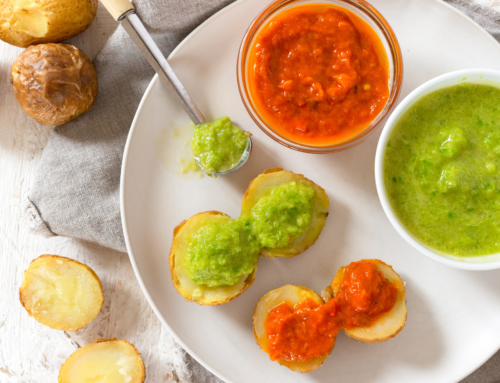Experience Eating Mindfully
By Julianne Riva
Updated February 27, 2015
I come from a family of fast eaters. As the youngest of five, I was conditioned to scarf down my meal so that I wouldn’t miss out on the most important part — dessert. This habit stayed with me into adulthood. If I wasn’t eating my meals in a rush while thinking about what I needed to do next, I was mindlessly eating in front of the TV. I am now working to change this habit through the practice of mindful eating. I say “practice” intentionally because mindful eating is not a skill learned overnight. However, with time and attentiveness, it becomes a habit that I believe aligns brilliantly with many aspects of the Mediterranean diet.
Mindful eating is an ancient Buddhist practice that encourages us to slow down and be entirely present throughout our meal. This means devoting our full attention to our food, our body, and our thoughts during the process of eating. By taking a moment to examine what foods we are choosing to consume, where the food comes from, how we feel before and after eating, and why we are eating, we can gain a healthy and enjoyable relationship with food. The best part is that mindful eating does not have to be practiced alone. Many cultures, including the Mediterranean, make leisurely meals with family and friends an integral part of their day. They take time to relish their food and their company. After all, eating should be a pleasurable experience!
It is important to note that mindful eating, similar to the Mediterranean diet, is not a diet at all, but rather a lifestyle. Unlike a diet, mindful eating is not a temporary fix to help us lose weight. It is not meant to restrict us from eating certain foods, or leave us feeling deprived after a meal. Instead, mindful eating is a sustainable change meant to increase our awareness of the present moment with every bite. With practice, it can become a gratifying part of our daily routine. Mindful eating teaches us compassion towards our planet and ourselves. We can then identify the types of foods that not only taste good, but also make us feel good, and help us to preserve our beautiful planet. Recent studies have demonstrated that mindful eating helps to reduce food cravings, body mass, and physiological distress in obese populations. Through regular practice, we can learn to listen to our body cues to determine when we feel hungry and when we feel satisfied. In turn, we are able to achieve a healthy weight.
The guidelines below are a useful tool to assist you in beginning your practice.
UNPLUG FROM ANY DISTRACTIONS: Before eating, turn off the TV, computer, cell phone or any other devices that may serve as a distraction. Clear a space at the table to avoid multi-tasking. The focus should be on your meal.
SIT DOWN: Place your food in front of you and sit down. Once you are seated, take a few deep breaths until you feel fully present and ready to begin. It may be helpful to begin your practice in silence. Often times, having a moment of silence is easier said then done. With kids running around and family members on various time schedules, having quiet time can be difficult. Do not be discouraged– you can learn to eat mindfully in any circumstance.
MAKE MEAL TIME THE MAIN EVENT: Schedule mealtime like you would schedule time in your day to unwind in front of the TV. Encourage family members and friends to join you in preparing, eating, and cleaning up after the meal. Eating mindfully reminds us that many people do not have this wonderful opportunity to share a meal with family and friends.
APPRECIATE THE FOOD: Before taking your first bite, look carefully at the food in front of you and smile. How often do we stop to really appreciate the food we are about to eat? Reflect on the source of the food. Imagine the natural environment in which it grew, the people that helped it to flourish, and all the steps that it took before ending up on your plate. Feel a deep sense of gratitude and appreciation for your food.
NOTICE: Begin to notice how you feel about putting this particular food in your body at this moment. Notice if you are feeling distracted, hungry, bored, etc. Practice non-judgment when observing any thoughts that arise.
BE PRESENT: As you begin, be present during each aspect of eating. How does the food smell? Notice all of the colors, flavors, and textures present in a single bite. How does the food feel as you swallow? Use all of your senses. Over time, you may notice that a Mediterranean diet of fresh fruits, vegetables, olive oil, legumes, and nuts will please all of your senses in a way that eating processed foods cannot.
SLOW DOWN: Carefully chew each bite. It may be helpful at first to count the number of times you chew each bite. Aim for 20-40 chews per bite. A study from the Journal of Academy of Nutrition and Dietetics found that increasing your number of chews might reduce caloric intake. Although the Mediterranean diet does not focus on caloric intake, chewing your food thoroughly may ensure that you are eating more reasonably sized portions. By slowing down, your stomach has enough time to signal to your brain that it is full. You may find it beneficial to put down your utensils between each bite so you can truly savor your meal.
LISTEN TO YOUR BODY: Your thoughts may be telling you to finish everything on your plate, but instead, listen to your entire body. Notice when you start to feel full. The Japanese practice called “hara hachi bu” says to eat until you are 80 percent full. This way you eat until you are no longer hungry, instead of eating until you cannot possibly eat any more. This is the opposite mentality of the “clean plate club” that many of us are accustomed to.
KNOW YOUR FARMER: Eating local produce provides you with a deeper connection to your food. Check out local Farmers’ Markets to discover what is in season. You may gain a greater sense of satisfaction knowing that your food is fresh and has a minimal
I encourage you to give mindful eating a try. Even committing to one or two of these guidelines will be beneficial for not only your own well-being, but that of the environment in which we live.












The Mediterranean way of eating completely works for our family which is my husband and I as we are empty nesters. Every dish I’ve made my husband has loved and when at my daughters her family loves the flavor of dishes I’ve made. One thing of the elements of the program that keeps me engaged is reading the articles and learning. It’s a great way of life.